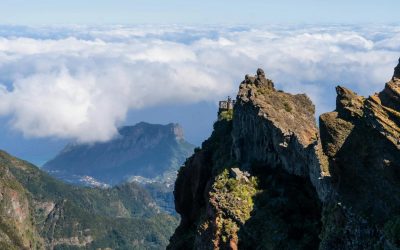Madeira, an Autonomous Region of Portugal, is often heralded as the pinnacle destination for American expats seeking the ideal living experience in Portugal. Its blend of a temperate climate, rich cultural heritage, and vibrant international community makes it not just an enchanting island in the Atlantic Ocean but a preferred choice for those contemplating living in Portugal.
The allure of Madeira extends beyond its picturesque landscapes to offer a seamless transition for American expats, thanks to the widespread use of English, especially in tourist areas, and a variety of clubs and organizations catering to diverse interests. This article explores why Madeira represents the best part of Portugal for an American’s expatriate life, providing insights into navigating visa processes, residency information, and firsthand experiences from those who have made the island their home.
Why Madeira Island Appeals to American Expats
Madeira Island emerges as a premier destination for American expats, attributed to its vibrant expat community, comprising approximately 200 Americans, and a diverse population that fosters a welcoming environment for newcomers. The island’s allure is further magnified by:
- Affordable Living Costs: Compared to the Algarve and much of Western Europe, Madeira offers a more economical living situation. Accommodation and amenities are reasonably priced, with monthly utilities averaging around 100 euros. This cost-effectiveness extends to lower utility costs, including electricity and internet, enhancing the appeal for American expats.
- Quality of Life Enhancements: The island boasts three international schools, making it an attractive option for expat families seeking quality education. Healthcare services are accessible and affordable, with a choice between public and private options, ensuring a high standard of living. The low crime rate across Madeira further assures a safe living environment.
- Cultural and Recreational Opportunities: Madeira’s rich cultural heritage and recreational activities cater to various interests. From the classic car culture to the diverse cultural offerings, including museums, festivals, and concerts, there’s always something to engage with. The sunny weather encourages a healthier lifestyle with outdoor activities. At the same time, initiatives like the Digital Nomad Village appeal to those seeking work and leisure in a picturesque setting.
These facets collectively underscore Madeira as an ideal locale for American expats. It offers a blend of affordability, safety, educational opportunities, and a rich cultural tapestry, all set against its stunning natural beauty and mild climate.
Navigating the Transition: Visa and Residency Information
For American expats contemplating moving to Madeira, navigating the visa and residency process is crucial. Here’s a streamlined overview:
- Visa Types and Residence Permits:
- Short-Stay (Schengen Visa): For stays up to 90 days.
- Temporary Stay: For specific purposes, duration varies.
- Long Stay (Residency Visas): Includes D2 (Entrepreneur), D3 (Qualified Workers), D8 (Digital Nomad), and more. Valid for 120 days, leading to a residence permit application.
- Application Requirements:
- Valid Passport
- Completed Application Form
- Proof of Financial Stability
- Proof of Accommodation
- Proof of Health Insurance
- Residence Permit Process:
- Initial Visa: Obtain a residency visa relevant to your situation (e.g., D7 for retirees, Golden Visa for investors).
- AIMA Meeting: Schedule a meeting with the Immigration and Borders Service (AIMA) within the visa’s 120-day validity to apply for a residence permit.
- Temporary to Permanent: Residence permits are initially temporary (2 years), with eligibility for permanent residence after five years. Permanent residents may then apply for Portuguese citizenship by naturalization, typically a 12-24 month process.
Highlighting Madeira as an exceptional location for American expats, this process underscores the island’s welcoming stance towards fostering a vibrant expatriate community.
Living in Madeira: Insights from American Expats
Living in Madeira offers American expats professional opportunities and a high-quality lifestyle, making it a standout location in Portugal. The job market is primarily centred around tourism and hospitality. It is complemented by healthcare, education, finance, and international business sectors, where English proficiency is highly valued, especially in tourist areas. However, learning Portuguese can significantly enhance the expat experience, fostering deeper connections with the local community and culture.
- Accommodation and Living Costs: Madeira caters to a wide range of preferences and budgets, offering everything from modern apartments to traditional houses. The cost of living, including housing, groceries, and entertainment, is generally more affordable than other European destinations, making Madeira an economically attractive option for American expats.
- Healthcare and Education: The island boasts a comprehensive healthcare system with both public and private options, ensuring accessible and quality medical care. For families, international and bilingual schools offer diverse educational opportunities for expat children, aligning with Madeira’s family-friendly appeal.
The vibrant expat community, rich cultural heritage, and many activities, from outdoor adventures to cultural festivals, underscore Madeira’s allure. This diverse and inclusive environment and the island’s safety and laid-back lifestyle position Madeira as an idyllic setting for American expats seeking a balanced life abroad.
American expats living in Portugal
Throughout the article, we’ve taken a comprehensive journey exploring Madeira’s unique appeal as not just an enchanting island destination but as the premier location in Portugal for American expats searching for an ideal living experience. From its cost-effective lifestyle, rich cultural tapestry, and welcoming expat community to the simplified visa and residency processes, Madeira stands out as the epitome of what one seeks in a relocation destination. These elements underscore Madeira’s allure and demonstrate its ability to blend modern conveniences and traditional charm that American expats find irresistible.
The insights shared by those who have made Madeira their home echo a unanimous sentiment: the island offers an unparalleled quality of life that fosters personal and professional growth. Whether it’s the vibrant cultural festivals, the high standard of healthcare and education, or the natural beauty and safety of the island, Madeira encapsulates the best of Portugal. As we conclude, it’s clear that for American expats contemplating a move to Portugal, Madeira represents not just a place to live but a place to thrive, offering a balanced and fulfilling expat experience amidst the breathtaking backdrop of the Atlantic Ocean.
FAQs
1. What are the preferred areas for American expats to reside in Portugal?
American expatriates tend to gravitate towards Lisbon, Portugal’s capital, where neighbourhoods like Chiado, Bairro Alto, and Alfama offer a lively urban lifestyle. Porto, the country’s second-largest city, is another popular choice for expats.
2. What might be some potential drawbacks to retiring in Portugal?
Retiring in Portugal can present several challenges, such as a slower pace of life that may not appeal to everyone, bureaucratic hurdles, the necessity of using cash for many transactions, the absence of central heating in homes, and lower average salaries compared to other European nations.
3. Can you outline the advantages and disadvantages of residing in Madeira, Portugal?
The advantages of living in Madeira include its mild climate, breathtaking scenery, affordable cost of living, and tranquil, secure environment. On the other hand, the island’s isolation, scarcity of employment opportunities, and relaxed tempo may not align with everyone’s preferences.
4. In Madeira, where is the expat community most concentrated?
Expats in Madeira commonly settle in Funchal, the island’s capital, because of its convenient urban facilities and accessibility. Other municipalities, such as Calheta and Ponta do Sol, located west of Funchal, are famous for their quaint charm and relaxed vibe.
Disclaimer: The information provided in this article is for informational purposes only and should not be considered legal or tax advice. Please consult a qualified professional for specific guidance tailored to your circumstances.

Miguel Pinto-Correia holds a Master Degree in International Economics and European Studies from ISEG – Lisbon School of Economics & Management and a Bachelor Degree in Economics from Nova School of Business and Economics. He is a permanent member of the Order of the Economists (Ordem dos Economistas)… Read more




